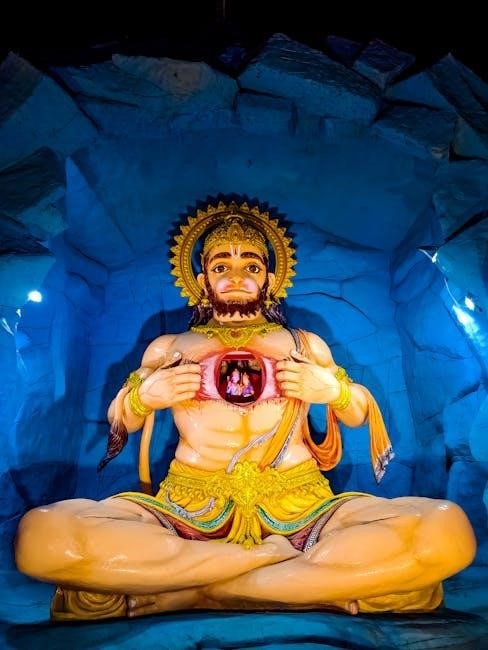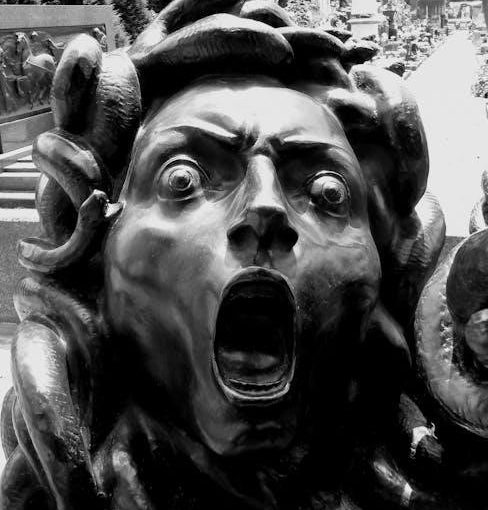Joseph Campbell, a renowned mythologist, explores the universal themes of mythology in The Power of Myth, a seminal work co-authored with journalist Bill Moyers. This iconic book and documentary series delves into the timeless stories that shape human understanding, bridging ancient myths with modern life’s complexities. Campbell’s insights reveal how myths transcend cultures, offering profound truths about existence, identity, and the human condition. His collaboration with Moyers brings mythology to life, making it accessible and relevant for contemporary audiences worldwide.
Who Was Joseph Campbell?
Joseph Campbell was a distinguished American professor of literature, renowned for his work in comparative mythology and comparative religion. He taught at Sarah Lawrence College and dedicated his career to understanding the universal themes and symbols present across cultures. His work spanned various aspects of mythology, leading to the development of the concept known as “The Hero’s Journey,” which has had a profound impact on literature and popular culture. Campbell’s collaboration with journalist Bill Moyers on The Power of Myth further cemented his legacy, making complex mythological ideas accessible to a broad audience through both book and documentary formats, influencing fields beyond academia.
The Significance of “The Power of Myth”
The Power of Myth holds profound significance as it bridges ancient myths with modern life, offering insights into universal themes such as love, death, and identity. Joseph Campbell’s collaboration with Bill Moyers in this work sparked a resurgence of interest in mythology, demonstrating its relevance in contemporary culture. The book and documentary series explore how myths transcend time and cultures, providing a framework for understanding human experiences. By examining subjects from modern marriage to virgin births, and figures like Jesus and John Lennon, the work illustrates the enduring influence of mythological narratives. This seminal work has not only educated but also inspired audiences, making it a cornerstone of modern mythological studies and a testament to Campbell’s enduring legacy.

The Structure of “The Power of Myth”
The Power of Myth is structured as a six-part series, each focusing on distinct mythological themes. Based on conversations between Joseph Campbell and Bill Moyers, it explores topics like the hero’s journey, creation myths, and the role of myth in modern life, offering a comprehensive examination of universal stories and their enduring relevance.
Overview of the Book’s Content
The Power of Myth is a compelling exploration of mythology’s role in human culture, presented through a series of conversations between Joseph Campbell and Bill Moyers. The book delves into universal themes such as the hero’s journey, creation myths, and the symbolism of rituals, offering insights into how myths shape human understanding. Campbell examines stories from diverse cultures, highlighting their shared patterns and meanings. He also discusses the relevance of myth in modern society, arguing that myths provide a framework for navigating life’s challenges and understanding our place in the world. The book is both a tribute to ancient traditions and a call to embrace myth’s enduring wisdom in contemporary times.
The Role of Bill Moyers in the Documentary Series
Journalist Bill Moyers played a pivotal role in the documentary series The Power of Myth, serving as both interviewer and interlocutor to Joseph Campbell. Moyers’ engaging questioning style and deep curiosity about mythology created a dynamic dialogue that brought Campbell’s ideas to life. His ability to simplify complex concepts made the series accessible to a broad audience. Moyers’ participation not only facilitated Campbell’s storytelling but also highlighted the relevance of mythology in modern life. The chemistry between Moyers and Campbell transformed the series into a captivating exploration of mythological themes, ensuring its enduring appeal and educational value. Moyers’ contribution was instrumental in making the series a landmark in cultural and intellectual discourse.

Key Concepts Explored in the Book
The Power of Myth explores universal themes like the hero’s journey, creation myths, and the symbolic meanings behind rituals and legends. Campbell examines how myths transcend cultures, reflecting shared human experiences and the eternal quest for meaning. The book delves into the interplay between mythology and modern life, highlighting how ancient stories continue to influence contemporary beliefs and identities; Campbell also discusses the psychological and sociological significance of myths, offering insights into their role in shaping individual and collective consciousness.
The Hero’s Journey and Its Universal Appeal
Joseph Campbell’s concept of the Hero’s Journey is a central theme in The Power of Myth, describing the universal pattern of adventure and transformation found in myths worldwide. This archetype follows a hero who leaves the ordinary world, faces challenges, and undergoes a profound transformation, ultimately returning with newfound wisdom. The journey’s universal appeal lies in its reflection of human experiences, aspirations, and psychological growth. Campbell illustrates how this pattern transcends cultures, appearing in stories from ancient myths to modern films. The Hero’s Journey resonates deeply with audiences, offering insights into personal growth and the collective unconscious. Its timeless relevance continues to inspire art, literature, and self-discovery, making it a cornerstone of Campbell’s work.
Comparative Mythology and Its Relevance Today
Joseph Campbell’s work in The Power of Myth emphasizes the importance of comparative mythology, revealing how myths from diverse cultures share common themes and symbols. By examining myths from around the world, Campbell demonstrates that they address universal human concerns, such as the meaning of life, death, and the unknown. These stories, though rooted in ancient traditions, remain relevant today, offering insights into modern societal challenges and personal struggles. Campbell’s comparative approach highlights the shared human experiences that transcend cultural boundaries, showing how myths continue to inspire and guide individuals in understanding their place in the world. This timeless relevance underscores the enduring value of mythology in contemporary life.

The Role of Myth in Modern Society
Myths continue to influence modern society by providing timeless wisdom and cultural identity. They bridge the past and present, offering insights into contemporary challenges and universal human experiences.
Myth and Religion in Contemporary Culture
Myths and religious narratives continue to shape contemporary culture, offering profound insights into human values and beliefs. Joseph Campbell highlights how myths transcend traditional religious contexts, influencing modern spirituality and cultural identity. In The Power of Myth, Campbell explores themes like virgin births, divine figures, and sacrificial heroes, showing their relevance across religions and societies. These stories, often intertwined with religious doctrines, provide a universal language for understanding life’s mysteries. Campbell argues that myths, even in secular societies, inspire personal transformation and collective meaning, bridging the gap between ancient traditions and modern experiences. This interplay underscores the enduring power of myth in shaping cultural and religious landscapes.
The Impact of Myth on Personal and Collective Identity
Myths profoundly shape both personal and collective identity by providing archetypes and stories that resonate across cultures and time. Joseph Campbell, in The Power of Myth, explains how myths offer a universal framework for self-discovery and understanding one’s place in the world. They inspire individuals to embrace their unique journeys, much like the hero’s journey, fostering personal growth and transformation. Collectively, myths create shared identities by unifying communities through common values, traditions, and histories. These narratives help people connect with their heritage and define their role within society. Campbell emphasizes that myths, even in modern times, continue to influence how individuals and groups perceive themselves, making them a vital part of human identity and cultural cohesion.

The Legacy of “The Power of Myth”
The Power of Myth continues to inspire and transform consciousness, offering timeless insights that resonate globally. Its influence spans popular culture, film, and psychology, ensuring Campbell’s ideas endure.
The Book’s Influence on Popular Culture
The Power of Myth has profoundly shaped popular culture, inspiring creators like George Lucas, who credited Campbell’s ideas for shaping Star Wars. The book’s themes of the hero’s journey and universal myths have influenced filmmakers, writers, and artists globally. Its exploration of mythology’s relevance in modern life has resonated with audiences, making it a cornerstone of cultural discourse. The PDF version of the book has further amplified its reach, allowing new generations to engage with Campbell’s insights. By bridging ancient myths with contemporary storytelling, The Power of Myth continues to inspire creativity and reflection, ensuring its enduring impact on popular culture and beyond.
The Enduring Relevance of Campbell’s Ideas
Campbell’s ideas, as presented in The Power of Myth, remain timeless and universally relevant. His exploration of mythology’s role in shaping human identity and culture continues to resonate, offering insights into modern challenges. The PDF version of the book has made his work more accessible, ensuring that new generations engage with his theories. Campbell’s concepts, such as the hero’s journey, provide a framework for understanding personal growth and societal evolution. His emphasis on the interconnectedness of myths across cultures highlights the shared human experience. As a result, his ideas continue to inspire academic and cultural discourse, proving their enduring relevance in today’s world.
